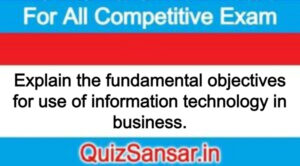
Explain the fundamental objectives for use of information technology in business.
Explain the fundamental objectives for use of information technology in business.
Ans.
The six important business objectives of information technology are new products, services, and business models; customer and supplier intimacy; survival; competitive advantage; operational excellence; and:
(a) improved flexibility.
(b) improved decision making.
(c) improved business practices.
(d) improved efficiency.
A wrong choice of the information technology would also kill the MIS designer’s ability to develop a user-friendly end user computer system, providing all capabilities of the data and the information handling with flexibility and speed.
The choice of information technology can be compared to a decision of constructing a house. Though the cost of construction is a major decision parameter, many other factors such as the living comfort and convenience, accommodation of the family members with their respective liv.ng styles, etc. are equally important. Besides a house should have a privacy, should be aesthetic to look at, airy and well lit and also the maintenance of facilities and utilities should be easy. A wrong choice of house, therefore, affects the buyer for the lifetime, both, in terms of the cost and also in terms of comfort. The decision is usually irreversible and very costly, and may not satisfy all the needs of the members of the family.
Objectives for use of Information Technology in Business :
(1) Re-engineering Business Processes: Information technology is a key ingredient in re-engineering business operations by enabling radical changes to business processes that dramatically improve their efficiency and effectiveness. Internet technologies can play a major role in supporting innovative changes in the design of work flows, job requirements, and organizational structures in a company.
(2) Improving Business Quality: Information technology can be used to strategically technology can be used to strategically improve the quality of business performance. In a total quality management approach, IT can support programs of continual improvement in meeting or exceeding customer requirements and expectations about the quality of products, services, customer responsiveness, and other features.
(3) Building a Customer-Focuses E-Business: A key strategic use of Internet technologies is to build an E-business, which develops its business value by making customer value its strategic focus. An E-business enterprise uses Internet, intranet, and extranet E-commerce websites and services to keep track of their customers’ preferences; supply products, services, and information anytime, anywhere; and provide services tailored to the individual needs of their customers.
(4) Creating a Virtual Company: Forming virtual companies has become an important competitive strategy in today’s dynamic global markets. Internet and other information technologies play an important role in providing computing and telecommunications resources to support the communications, coordination, and information flows needed. Managers of a virtual company depend on IT to help them manage a network of people, knowledge, financial, and physical resources provided by many business partners to quickly take advantage of rapidly changing market opportunities.
(5) Becoming an Agile Company: A business can use information technology to help it become an agile company. Then it can prosper in rapidly changing markets with broad product ranges and short model lifetimes in which it must process orders in arbitrary lot sizes, and can offer its customers customized products while maintaining high volumes of production. An agile company depends heavily on Internet technologies to help it be responsive to its customers with customized solutions to their needs and cooperate with its customers, suppliers, and other businesses to bring products to market as rapidly and cost-effectively as possible.
(6) The Challenge of Strategic IS: Successful strategic information systems are not easy to develop and implement. They may require major changes in how a business operates internally and with external stakeholders. Sustained success depends on many environmental and fundamental business factors, and especially on the actions and strategies of a company’s management team. So developing strategic uses of information technology is a major managerial challenge.
(7) Building a Knowledge-Creating Company : lasting competitive advantage today can only come from innovative use and management of organizational knowledge by knowledge-creating companies and learning organizations. Internet technologies are widely used in knowledge management systems to support the creation and dissemination of business knowledge, and its integration into new products, services, and business processes.






